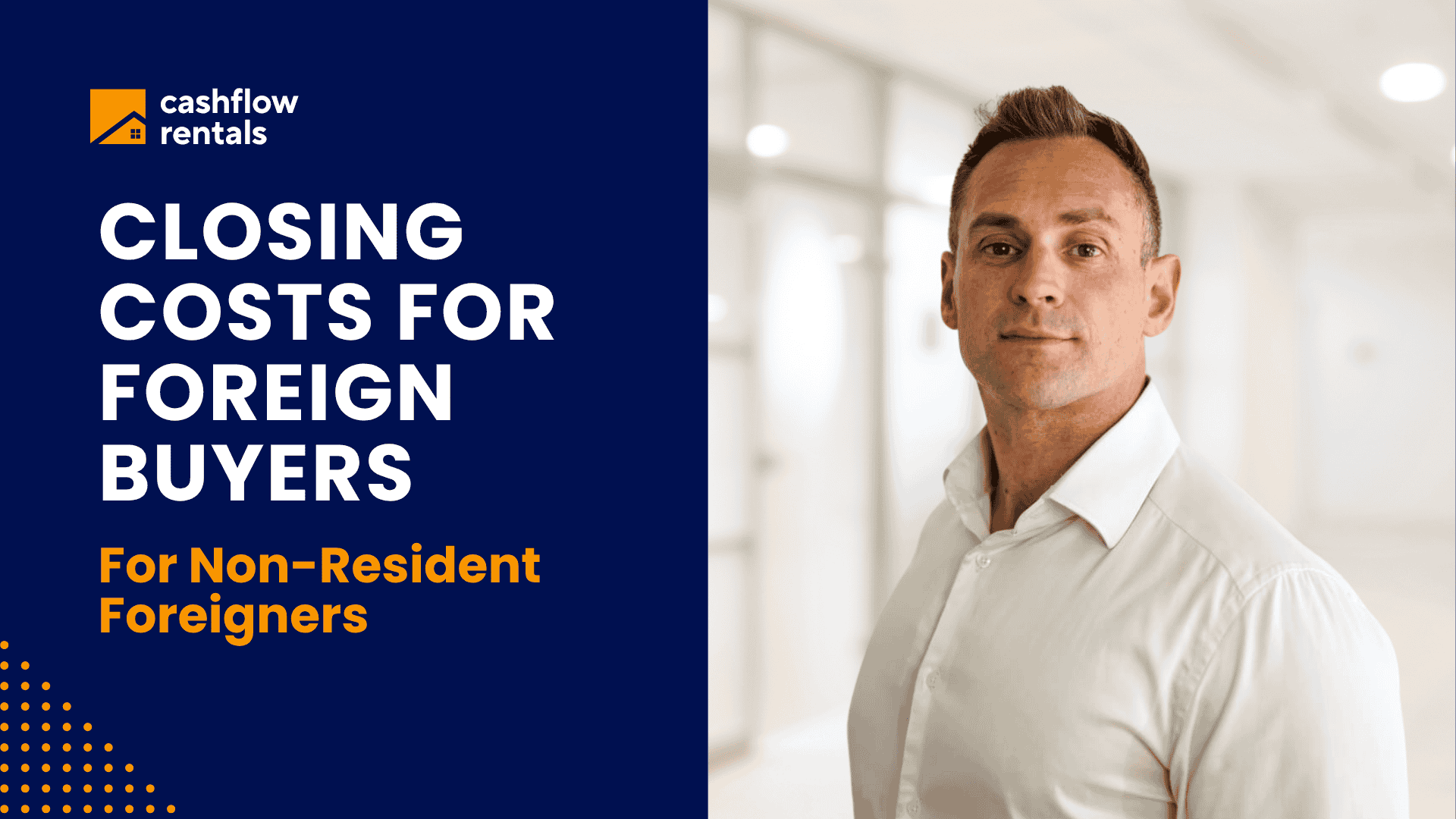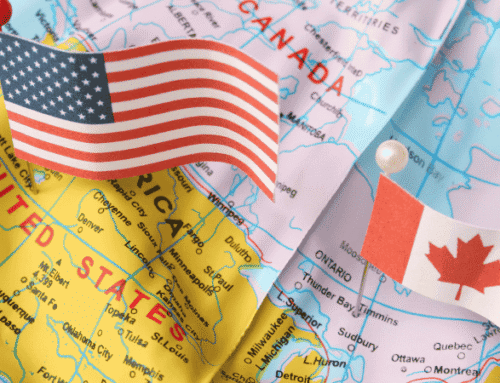Closing Costs in the USA for Foreign Property Buyers
FREE DOWNLOAD: 10 Costly Mistakes Foreigners Make Buying U.S. Real Estate
When I bought my first US investment property as a foreigner in 2016, I was shocked by the closing costs. I expected to pay transfer taxes and legal fees, but hadn’t considered all the upfront costs associated with the mortgage.
After purchasing over 120 US properties, I’ve learned exactly what international investors need to budget for. Here’s my breakdown of the closing costs that catch most foreign buyers by surprise.
Mortgage-Related Expenses: The Biggest Surprise
The mortgage process creates the most unexpected costs for international investors. These include origination fees, additional legal and admin fees, appraisal fees, lender’s title insurance, and recording fees.
Then there are the cash reserves. While not technically a fee, lenders require you to keep money on account.
I’ve seen some lenders require up to 12 months of debt service, tax, and insurance costs upfront. Typically, with a lower loan-to-value, the cash reserve requirement decreases.
For most foreign investors, you should plan to set aside about 3 months of loan payments as reserves. This is cash you must bring to the closing table.
Related: How to Buy Property in the USA as a Foreigner
Remote Signing: A Uniquely Foreign Challenge
As a foreign buyer, you’ll face hurdles with document signing that US citizens don’t encounter.
You have two options: sign documents yourself with both a notary and apostille then courier them to the US before closing, or pay for an authorized signatory in the US (though some lenders don’t allow this).
The costs vary by location. In the UK, you might need 10 signatures across your documents. Each notarization costs about $50, plus another $50 per apostille.
This means you could easily spend $1,000 just getting documents properly signed and authenticated. These are expenses American buyers simply don’t face.
Related: Best US Property Markets for Foreign Investors
Regional Variations: From 2% to 9%
Closing costs vary dramatically across states. In my experience buying across multiple US regions, I’ve paid between 2% and 9% of the purchase price in closing costs.
The biggest factor isn’t necessarily the state, but whether you’re paying cash or using a mortgage. Mortgage fees add up quickly.
In Ohio, for example, a cash purchase might cost around 3% in closing costs. Add a mortgage, and that figure can jump to 9% when you include all the loan-related expenses.
Tax Considerations at Purchase
Many foreign investors worry about FIRPTA (Foreign Investment in Real Property Tax Act), but this actually applies when you sell, not when you buy.
At purchase, you’ll primarily deal with transfer taxes (which vary by state) and pro-rated property taxes. These should be clearly outlined in your closing documents.
Related: Cleveland’s Population Shift is Driving Real Estate Investing Opportunities
Banking and Currency Exchange
International transfers have become much easier in recent years. Traditional banks and neo-banks now facilitate inward transfers to the US more efficiently.
Platforms like Wise and Airwallex provide competitive exchange services that can save you thousands on larger transactions.
According to a Wise analysis, using specialized money transfer services instead of traditional banks can save foreign investors up to 3% on currency conversion for property purchases.
Related: Hidden Risks for Section 8 Property Investments
Legal Structures: The LLC Advantage
Setting up a US LLC is typically advisable for foreign investors. This relatively simple process costs between $200 and $1,000 depending on your approach.
A US LLC protects your personal liability if you get sued. It also simplifies opening US bank accounts and securing mortgages.
However, there aren’t specific tax advantages since the IRS considers it a “disregarded entity.” You’ll still file your own US tax return annually to report US income.
Be aware that an LLC isn’t right for everyone. Canadian investors, for instance, might face double taxation when using a US LLC to purchase American real estate.
Related: Landlord Friendly Real Estate Markets for Overseas Property Investors
Title Insurance: Critical Protection
Title insurance is essential but unfamiliar to many foreign investors. It protects your investment from any issues with the property’s title, such as liens, mortgages, or other defects you might become responsible for as the owner.
You’ll need owner’s title insurance, and if using a mortgage, lender’s title insurance as well.
For a $200,000 property in Ohio, expect to pay about $1,000 for owner’s title insurance and approximately $700 for lender’s title insurance.
While this seems expensive, it could save you thousands later. The American Land Title Association reports that title professionals find and fix problems with the title in more than one-third of all real estate transactions.
Related: Navigating US Mortgage Rate Uncertainty for Foreign Property Investors
Itemized Closing Costs for Foreign Buyers
Here’s an example of approximate closing costs for a foreign property buyer based on the purchase of a $200,000 property using a 75% LTV DSCR loan
1. Property Purchase Costs
Purchase Price: $200,000
Deposit (25%): $50,000
2. Loan Related Costs
| Loan Origination Fee (1–2% of loan) | $1,500 – $3,000 (assumes 1–1.5% of $150,000 loan) |
| Lender Admin / Underwriting Fee | $500 – $750 |
| Appraisal (Full) | $700 |
| Credit Report Fee | $50 – $100 |
| Flood Certification | $15 – $25 |
| Prepaid Interest (7.75% x 15 days) | ~$480 |
| DSCR Loan Points (if applicable) | Varies (some lenders charge 1–2 pts = $1,500–$3,000) |
| Mortgage Recording Fee (county) | ~$100 |
3. Title, Recording & Escrow
| Title Company Closing Fee | $1,000 (flat, per your input) |
| Owner’s Title Insurance (Ohio rates) | ~$1,100 (standard rate on $200K) |
| Lender’s Title Insurance | ~$250 – $300 |
| Title Exam / Search Fee | ~$250 – $300 |
| Document Recording Fees | ~$100 |
| Courier / Wire Fees | $50 – $150 |
4. Tax & Escrow Prepaids
| Property Taxes (Prorated) | ~$750 (approx. 3 months of $3,000 annual taxes) |
| Tax Escrow Reserve | ~$1,500 (6 months held by lender) |
| Homeowners Insurance (annual) | ~$1,000 (varies by location & coverage) |
| Insurance Reserve (2 months) | ~$170 |
5. Inspection & Due Diligence
| General Home Inspection | ~$400 |
| Sewer Scope | ~$200 – $300 |
| Radon / Termite (optional) | Not included here |
TOTAL BUYER CLOSING COSTS & RESREVES (EXCLUDING DOWN PAYMENT)
Estimated Range: $10,050 – $13,050
(not including optional points or reserves held longer by lender)
Add-Ons (If Applicable)
LLC Setup Fee (if new): ~$200 (state filing only)
Registered Agent / Annual Ohio LLC Fees: ~$100/year
CPA / Tax Setup for ECI Filing: Varies (~$500–$1,000)
Seller Concessions
One of the best tools we have available as foreign property investors is a seller concession. I use this strategy all the time to:
✅ Reduce my closing costs
✅ Pay less tax
✅ Get a better mortgage rate
✅ Pay less interest
✅ Improve cashflow
It works like this…
When we negotiate the deal, instead of asking for a discount, we ask for a seller concession towards out closing costs. On a $200,000, we might easily negotiate $10,000.
That should pay for most of our closing costs, and might even have some left over to pay for a mortgage rate buydown to reduce our monthly payment, improve net cashflow and reduce the total amount of interest we pay on the mortgage.
We’ll also be paying full price for the property, which increases our cost basis for accounting purposes so we can make a bigger depreciation deduction and reduce our annual taxable income.
Related: Cleveland’s Population Shift is Driving Real Estate Investing Opportunities
The Bottom Line
As a foreign investor who’s purchased over 120 US properties, I’ve learned that proper budgeting for closing costs is essential.
Plan for 3-9% of the purchase price in total closing costs, with the higher end applying to mortgage-financed purchases.
The extra expenses unique to foreign buyers—remote signing, currency exchange, and legal structures—can add another 1-2% to your total investment.
Understanding these costs before you begin will prevent unpleasant surprises and help you accurately calculate your true return on investment.
At Cashflow Rentals, we’ve been helping non-US citizens navigate these complexities since 2022, drawing on our own experience building a portfolio of US rental properties since 2016.
With proper planning and expert guidance, these closing costs become a manageable part of what can be a highly profitable investment journey in the US real estate market.







![USA Property Investment for Foreign Buyers [2025 Guide]](https://cashflowrentals.net/wp-content/uploads/2025/07/USA-Property-Investment-for-Foreigners-Expert-2025-Guide-500x383.png)



